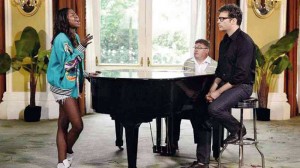Behind the music

“AMERICAN Idol” contestant Amber Holcomb runs through “My Funny Valentine” in front of guest mentor Harry Connick Jr. photo:fox/https://au.ibtimes.com
I haven’t been watching too much TV (not the singing competitions in particular, save for a few episodes of “The Voice” for my research and strategy development), so I have little idea of what’s been going on. However, one article posted on nextavenue.org about guest mentor Harry Connick Jr. and his recent stint on the popular series “American Idol” piqued my interest.
The article was written by John Stark and titled “Why Harry Connick Jr. Couldn’t Sit Idle During ‘Idol.’” Mr. Connick was invited to mentor the finalists for a Then and Now episode. He was supposedly very nice while coaching the singers for the Now section, hugging and joking around with them. But when he coached them on Then songs, he became more serious. I didn’t catch the episode; I have to take the writer’s word for it.
Apparently, the finalists had selected songs from the great American songbook to interpret, songs that none of them knew anything about. Mr. Connick walked them through these great classic standards (which comprise a big part of his own repertoire—he knows his way around this kind of music). Of his advice, little was taken.
Frustration
Article continues after this advertisementWhaaattt? Here’s one of the best modern-day interpreters of the genre, and they didn’t give him his due?
Article continues after this advertisementIt’s a frustration that I share, not only with Mr. Connick (with whom I’ve had the pleasure of performing a few years ago, singing songs of Rodgers and Hammerstein) but with many other professional performers and musicians, people I respect for their respect for music, lyrics, back story and interpretation.
Nowadays, singing seems to be all about vocal gymnastics performed by many contemporary divas. Quickness, dexterity, strength are all fine and good but, when used gratuitously, can be likened to eating a gallon of ice cream for breakfast, lunch and dinner: It’ll give you a tummy ache and a brain freeze.
I’ll admit: I do love the vocal tricks that people like Celine Dion, Beyoncé and Barbra Streisand are able to do. My vocal chords would probably bleed if I tried too much of it. However, as artists, they are also great at paying due respect to the writers of the songs they sing, and at figuring out what a song means. It’s not about just the tricks, which would be like frosting on the cake, but also the soul of a song, or the cake itself.
I’m going to lift an example from the nextavenue.org article: “My Funny Valentine,” a song by Richard Rodgers and Lorenz Hart:
“My funny valentine, sweet comic valentine/ You make me smile with my heart
Your looks are laughable, un-photographable/ Yet you’re my favorite work of art
Is your figure less than Greek? Is your mouth a little weak?/ When you open it to speak, are you smart?
Don’t change a hair for me, not if you care for me
Stay, little valentine, stay
Each day is Valentine’s Day.”
The songwriter
Many of these lines seem easy enough to comprehend, but what about “Is your figure less than Greek?” I’m no Lorenz Hart expert by any means, but doing a little research on the Internet brought forth this result: “Are you less than a Greek god or goddess in physical splendor?” Or, more simply, “Are you less than bodacious?”
Lorenz Hart, the man who wrote these lyrics, stood just below 5-feet tall, was gay when it wasn’t OK to be out of the closet, suffered from depression for much of his life, and thought of himself as very unattractive. It sure makes reading “My Funny Valentine” all the more interesting, and would give an equally interesting interpretation.
A song isn’t ever just a song. It’s a mini story. Figuring out what a song means is infinitely important. It’s not enough to map its musical trajectory from a technical standpoint. It’s even more important to know its emotional arc, as well as the story behind it.
I sing a lot of different kinds of songs. I’ve attempted jazz, standards, musical theater, pop and R&B. Although these genres are stylistically different from one another, the approach to a song can be pretty much the same: Figure out the story, its real meaning, spirit and soul. Place your own heart in that story, as though it was happening to you. If it’s a happy song, let your heart reflect its joy. If it’s a song of heartbreak, go ahead and let your own heart break a little along with it.
There are singers that only skim the surface. Isn’t it more gratifying to hear an artist put his or her heart into a song, taking yours along for the ride?
Oopsie!!!
The choreographer of the recently concluded production of “The Full Monty” was Cecile Martinez. Sorry, Cecile! I regret the error. Thanks to Gemini Quintos for pointing this out.
